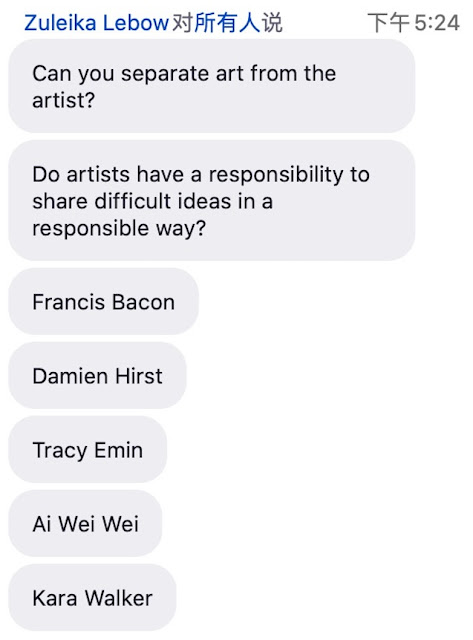Feedback and self-reflection after Zuleika’s tutorial
On the afternoon of August 1st, I had a tutorial with Zuleika.
As the previous topic I had chosen (how to protect minors from sexual assault through wearable devices) was challenging to do effectively in my current capacity, after a month of struggle and advice from my tutors, I finally decided to change the topic and think about it from a different perspective, human nature has its negative impulses and thoughts, how can we use this negative energy for something constructive? How can we channel and control the dark side of ourselves, and I thought art might be the perfect thing to do so.
After talking to Zuleika, I finally settled on this topic and Zuleika gave me some beneficial advice.
While we were talking about this topic Zuleika suggested to me some artists and their works that would be very suitable for this topic, such as Francis Bacon and others who have a strong artistic style and whose works show an observation of human nature, most of which I had known before, and a few of which I didn't know much about yet and I would have to get to know them after the class.
We also discussed whether it is possible to separate the artist's work and the artist. Is it the responsibility of the artist to share difficult ideas in a responsible way?
And I also raised an interesting phenomenon that I had noticed earlier, that in many cases artists are perceived by the general public as having qualities such as "eccentric", "maverick", "different". I wonder if these strong personality traits create an innate need to use art as an outlet to vent their emotions and heal themselves.
Based on the ideas I expressed to her in class, Zuleika helped me to create a mind map and I think the core idea of my topic is that we have to accept that human nature has a "dark side", which reminds me of the classical Chinese book "Tao Te Ching" which says that "yin and yang" follow each other and it is no good or bad, and that "jealousy", "anger" and "hatred" are equal to the emotions "like", "happiness" and "joy"; without the former, the latter cannot be felt.
They are not bad emotions, people just need to express them in a more constructive way, rather than suppressing them, which ultimately leads to "emotional dysregulation".
During the class, we also came up with a few key problems that I need to address in my next study:
1. Who are my stakeholders?
2. Who are my experts?
3. What is the change I want to make?
4. Who will benefit from the change?


